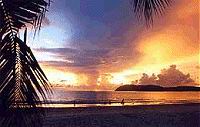|
|
abcmalaysia.com
|
|
|
Malaysia Travel Guide |
| About Malaysia Johor Kedah Kelantan Kuala Lumpur Labuan Melaka N. Sembilan Pahang Penang Perak Perlis Putrajaya Sabah Sarawak Selangor Terengganu |
|
|||||||||||||
|
• Background • Legends & Myths • Kuah Town • Getting There • • Sightseeing • Beaches • Islands • Travel Tips & Weather •
Pulau Langkawi's landscape is painted with marbled mountains, vast paddy fields and rural villages, miles and miles of white sandy beaches, secret caves, and pockets of virgin rainforests dating back millions of years.
Click on the highlights for more info
Visitors to Langkawi may be caught off-guard by its rusticity and slow pace of life. Most of its inhabitants still retain their traditional ways of living - fishing and cultivating their hard-earned harvest from the ground. Old Langkawi was characterised by padi (rice) fields and kampung (village) style living, a laidback atmosphere, bullock carts and dirt roads. for the past decade or so, The sea remains a healthy source of income for local fishermen. In pockets of local fishing communities one can still find the age-old cottage industry of harvesting, drying and processing of sea cucumbers into a balsamic oil (gamat) for all sorts of minor ailment.
Langkawi was said to have been used as a hideout by pirates in the days of yore and with so many uninhabited small islands located so close to each other, it is easy to imagine why. retaining its traditional values. World class resorts and golf courses have been built alongside more traditional rest houses. Direct flights, a new Marina and fast ferry services have improved communications, making the island one of Malaysia's premier destinations. As legendary as the beauty of Langkawi are the mysterious legends and myths of ogres and giant birds, warriors, wronged maidens and fairy princesses. years or so. It is widely believed that its present underdeveloped state was brought about by the curse of an innocent woman, lusted after by a man and envied by his wife. This is the legend that is Langkawi. Kuah is Langkawi's main town and port where ferries from the mainland and Penang anchor. Kuah Town is a couple of rows of rebuilt shop houses with a decidedly sleepy feel. The name "Kuah" is a Malay word meaning "gravy" and is associated with an ancient legend of two battling giants who overturned a gigantic pot of curry at the spot where the town now stands. A one-way ride takes about an hour. There are dependable express coaches from Kuala Lumpur, Alor Star or Arau to Kuala Kedah and Perlis. Malaysia Airlines and Air Asia flies daily from Kuala Lumpur. KTM Train Services also operates the Langkawi Express rail service what can be considered a worthwhile visit or not. Also provides an insight on things to do and activities that you can enjoy during your stay in Langkawi
BEACHES ~ STAY ~ DINING & ENTERTAINMENT The key beaches on the island are Pantai Cenang, the main strip near the airport where several of the larger hotels are located, Datai Bay, in the northwest, a splendid cove of exclusive white sand set in stunning rainforest, and Tanjung Rhu, a broad, sparkling white bay to the northeast. Up north as well is the tiny, rustic, hideaway cove of Pasir Tengkorak
Langkawi hotel choices are varied and range from humdrum to soaringly up market. Rates also vary dramatically between high and low seasons. High season is the dry period November to March You may have to motor about a bit to get anywhere and a good meal is like a journey. The cuisine is a combination of regional and western, but as Thailand is so close, the mixture of the Malay and Thai cultures also results in a unique gastronomic experience.
Langkawi is the largest of around a cluster of 99 islands that form the Langkawi archipelago. Many are uninhabited, little more than rocky outcrops separated by narrow channels with coral reefs, a diverse marine life and unusual wildlife. Islands described here includes Pulau Dayang Bunting, Pulau Beras Basah Pulau Singa Besar, Pulau Payar, Pulau Tuba, Pulau Rebak and Other Islands. Langkawi island is part of Kedah state, so it observes the same rest day as Kedah. Banks and government offices close on Fridays and Saturday afternoons but remain open on Sundays. If you are a foreign tourist and would need to change your currency to Ringgit, then it would be best if you did so at the banks at Kuah. Other places you can do so are the resort hotels but some may reserve this service for their guests. temperature of about 32 degrees Celsius. The rainy season is during August / September, although there are occasional showers throughout the year.
|
|
||||||||||||
